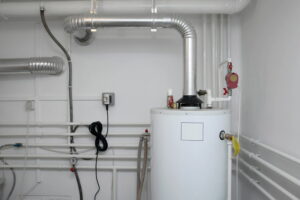 If you have a water heater in your home—and let’s face it, what modern home doesn’t have one of these systems—then you’ve probably been told by a plumber that at some point, you’re going to need maintenance! Perhaps you’re wondering why this service is important, or even necessary. The answer to this is summed up in one word—scaling.
If you have a water heater in your home—and let’s face it, what modern home doesn’t have one of these systems—then you’ve probably been told by a plumber that at some point, you’re going to need maintenance! Perhaps you’re wondering why this service is important, or even necessary. The answer to this is summed up in one word—scaling.
You’ve likely heard the term hard water before, right? Hard water is water that has a high level of minerals in it—namely calcium, magnesium, and iron. For most people, these minerals are totally harmless to ingest. However, they are not so harmless for your plumbing system, because the minerals leave deposits behind—which is what’s known as scaling.
Scaling can negatively impact your water heater more than any part of your plumbing system (though, it’s not great for any part of your plumbing system!) While you can easily clean scale off of a faucet or a drain opening, that doesn’t do much for the pipes, or for your water heater’s interior. Read on to learn more!
More about Scaling
Have you ever discovered a flaky green, yellow, or white buildup around your faucets, faucet handles, or drain openings? Scaling is what you’re seeing. These mineral deposits simply can’t drain away as easily as water does, and they cling to a metal surface even as water rushes through.
This is how mineral deposits get lodged in the pipes—including the pipes leading into and out of your water heater—and settle at the bottom of your water heater’s tank.
This all impacts your water heater in a number of ways. First off, the buildup can develop in your plumbing pipes and effectively block water from moving through them if it gets thick enough.
More commonly discovered, however, is the damage that occurs to the tank of your water heater. Minerals build up at the bottom of the tank and on the heat exchanger component, making it hard for the water to get heated evenly. The result is decreased efficiency and pressure levels in the tank become unbalanced as well.
What’s worse is that the minerals rattle around at the bottom of the tank, and can force corrosion to begin.
How Do You Know When You Have Scale Buildup?
Perhaps the most apparent sign that scaling is impacting your water heater is the noise it makes when the sediment from it rattles in the water heater tank. This sound is often described as a popping or knocking noise. This happens as steam bubbles try to escape past the layer of sediment at the bottom of the tank.
Scaling can also affect the temperature of your water—and this problem isn’t exclusive to tank water heaters. It can also affect a tankless system. What happens is that the sediment sticks to and coats the heat exchangers, insulating them and making it impossible for the water to pick up heat.
Established in 1912, Max Sr & Paul Schoenwalder Plumbing, Heating and Air Conditioning, A Corp. is who to contact for Berkeley Heights water heater services.
